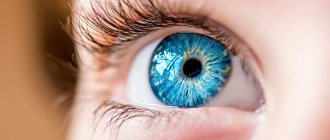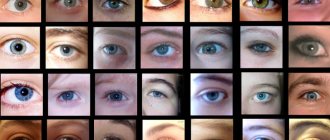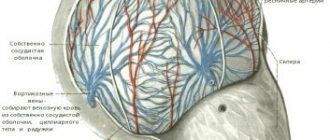The role of vision in human life and the consequences of its impairment
The role of vision in a person’s reflection of the surrounding world is exceptionally great. Mental activity is essentially a reflective activity, and in the course of anthropogenesis, a complex system of analyzers has been formed in humans, ensuring the flow of information necessary for normal life activity from the outside world. In this system, the visual, auditory and tactile-kinesthetic systems come to the fore, underlying the so-called gnostic, that is, having the greatest cognitive value, sensations and perceptions. It should be borne in mind that in this complex of analyzers the leading role in the process of sensory reflection belongs to vision.
The human eye, adapted to the reception of light energy, has a remarkable ability to navigate the world around it, identifying individual objects and spatial relationships between them by their illumination. At the same time, the visual analyzer has an unusually high sensitivity. Visual receptors are the most advanced light detectors. For the sensation of light to occur, only a few quanta are needed, and if it were possible to create ideal conditions for perception (absolutely transparent air, etc.), then a person could see a burning candle at a distance of about 27,000 m.
Visual sensations and perceptions provide a person with the largest amount of finely differentiated data of the widest range. It is also important that the field of visual perception is practically unlimited.
THEM. Sechenov wrote that the eye distinguishes eight categories of features: color, shape, size, distance, direction, corporeality, rest and movement, which allows vision to adequately reflect actual spatial relationships.
Of course, vision is not the only structural unit of sensory cognition that correctly reflects the surrounding world.
Visual sensations and perceptions are of great importance not only for cognition and practical activity, but are also an inexhaustible source of aesthetic experiences. This is especially true for color vision, which promotes better perception of objects.
The important role that vision plays in almost all activities should also be abolished. With the help of vision, a person monitors the correctness of the actions performed. For example, when developing the skill of writing, a child with normal vision controls his hand movements visually. In this case, the blind person monitors the correctness of the movements with the help of his hand. This circumstance significantly complicates and impedes the development of writing skills.
It is quite obvious that partial, and even more so complete loss of vision entails the most serious and often irreparable losses in the area of sensory reflection. The effect of a reduction in sensory experience on mental life has been noted by many psychologists.
Attention!
If you need help writing a paper, we recommend turning to professionals. More than 70,000 authors are ready to help you right now. Free adjustments and improvements. Find out the cost of your work.
Cost calculationGuaranteesReviews
The impossibility or significant limitations of receiving visual stimuli entails deviations in mental development, which, in modern psychological literature, are designated as deprivation damage. “Mental deprivation is a mental state that arises as a result of such life situations where the subject is not given the opportunity to satisfy some of his basic (life) mental needs in sufficient measure and for a sufficiently long time.” The authors of the above definition indicate that such needs are a perceptual need, that is, the need for a certain quantity and quality of external stimuli (stimuli), the need for social connections with parents, peers, etc., ensuring the integration of the individual, and, finally, the need for the presence of conditions for learning and subsequent self-realization, mastering certain social roles.
Based on the foregoing, it should be considered that visual impairment entails not only sensory (visual) deprivation, but also emotional (affective) and social deprivation. It should also be borne in mind that with congenital or early acquired blindness, children are deprived of not only visual stimuli - their stimulation of other modalities is sharply reduced due to the insufficient development of intact analyzers, limited mobility, and poverty of social connections and relationships. All this entails noticeable and very diverse changes in behavior and somatic state; quite often, with blindness and low vision, neuropsychic disorders are observed.
Pathology of visual perception (decreased visual acuity, narrowing of the field of view, disturbances of color and color discrimination) negatively affects the mental development of the blind and visually impaired.
Quantitative changes are observed mainly in the sphere of sensory cognition: in the blind and visually impaired, visual sensations and perceptions are significantly reduced or completely lost, and the number of ideas that limit the ability to form imaginative images decreases accordingly.
As for the qualitative features of the psyche of persons with visual impairments, they manifest themselves, albeit to varying degrees, in almost all areas of mental activity: the system of interaction between analyzers changes, certain specific features arise in the process of forming images, concepts, speech, the relationship between figurative and conceptual is disrupted in mental activity, individual changes are observed in the emotional-volitional sphere and some personality traits, orienting activity acquires a specific character, etc. Complete or partial impairment of visual functions also affects physical development, which is due to the complexity of spatial orientation and the resulting restriction of the blind in freedom of movement. A sedentary lifestyle, in turn, causes muscle weakness, skeletal deformation, hypofunction of internal organs, etc.
In general, in the blind and visually impaired (with spontaneous, uncorrected development), somatic weakness is observed (functional failure of the cardiovascular system, somatovegetative deviations), posture and gait are disturbed, changes in motor skills are observed - obsessive movements appear (for example, pressure on the eyeballs, swaying head, monster). Hypokinesia, that is, decreased motor activity, is widespread. Disorders of the nervous system, especially the autonomic one, are often observed. In some cases, due to a sharp reduction in sensory afferentation, psychopathological personality changes are possible.
The changes in the mental and physical development of the blind and visually impaired, listed even in the most general terms, convincingly show the need for a special study of their psyche in order to more fully and quickly overcome and prevent the consequences of visual defects.
We will help you write any paper on a similar topic.
- Essay
The role of vision in human life and the consequences of its impairment
From 250 rub.
- Test
The role of vision in human life and the consequences of its impairment
From 250 rub.
- Course work
The role of vision in human life and the consequences of its impairment
From 700 rub.
Receive completed work or specialist advice on your educational project
Find out the cost










